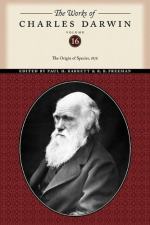Independently of the question of fertility, the offspring of species when crossed and of varieties when crossed may be compared in several other respects. Gartner, whose strong wish was to draw a marked line of distinction between species and varieties, could find very few and, as it seems to me, quite unimportant differences between the so-called hybrid offspring of species, and the so-called mongrel offspring of varieties. And, on the other hand, they agree most closely in very many important respects.
I shall here discuss this subject with extreme brevity. The most important distinction is, that in the first generation mongrels are more variable than hybrids; but Gartner admits that hybrids from species which have long been cultivated are often variable in the first generation; and I have myself seen striking instances of this fact. Gartner further admits that hybrids between very closely allied species are more variable than those from very distinct species; and this shows that the difference in the degree of variability graduates away. When mongrels and the more fertile hybrids are propagated for several generations an extreme amount of variability in their offspring is notorious; but some few cases both of hybrids and mongrels long retaining uniformity of character could be given. The variability, however, in the successive generations of mongrels is, perhaps, greater than in hybrids.
This greater variability of mongrels than of hybrids does not seem to me at all surprising. For the parents of mongrels are varieties, and mostly domestic varieties (very few experiments having been tried on natural varieties), and this implies in most cases that there has been recent variability; and therefore we might expect that such variability would often continue and be super-added to that arising from the mere act of crossing. The slight degree of variability in hybrids from the first cross or in the first generation, in contrast with their extreme variability in the succeeding generations, is a curious fact and deserves attention. For it bears on and corroborates the view which I have taken on the cause of ordinary variability; namely, that it is due to the reproductive system being eminently sensitive to any change in the conditions of life, being thus often rendered either impotent or at least incapable of its proper function of producing offspring identical with the parent-form. Now hybrids in the first generation are descended from species (excluding those long cultivated) which have not had their reproductive systems in any way affected, and they are not variable; but hybrids themselves have their reproductive systems seriously affected, and their descendants are highly variable.
But to return to our comparison of mongrels and hybrids: Gartner states that mongrels are more liable than hybrids to revert to either parent-form; but this, if it be true, is certainly only a difference in degree. Gartner further insists that when any two species, although most closely allied to each other, are crossed with a third species, the hybrids are widely different from each other; whereas if two very distinct varieties of one species are crossed with another species, the hybrids do not differ much. But this conclusion, as far as I can make out, is founded on a single experiment; and seems directly opposed to the results of several experiments made by Kolreuter.




